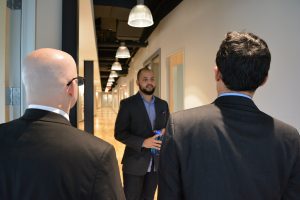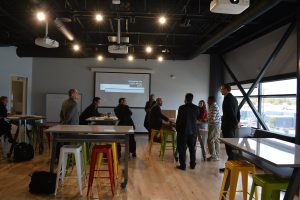By Wes O’Donnell
Managing Editor, AMU Edge
You can’t watch the news these days without a mention of a cybersecurity breach somewhere in the world. It’s always springtime for cybercriminals as they take advantage of the massive shortage of trained “white hat” cybersecurity professionals available to the industry.
According to a report by Cybersecurity Ventures, there will be a staggering 3.5 million unfilled cyber positions by the end of 2021!
Gone are the days where a single CTO and her small team could handle the IT needs of a medium to large corporation.
In the 2017 Global Information Security Workforce (GISW) Study, two-thirds of the nearly 20,000 responding companies indicated that they lacked the number of cybersecurity professionals needed for today’s threat landscape.
The bad guys are winning, so what can be done? How do we move forward as a society to strengthen information security in the Information Age?
Here are some options:
Millennials to the Rescue
You know those dang kids that older people like to complain about? The ones who are “just lazy and entitled”? Don’t believe it. The stereotype is the result of too many Facebook memes.
Today’s young people are some of the most technologically astute and philanthropic men and women in America. And they may very well be the generation that saves us all from a dystopian future in which cybercrime is rampant and unchecked.
So how do we engage these young people and get them excited about careers in technology? On paper, it shouldn’t be a hard sell. They have been raised in technology. For many millennials, however, money isn’t as big of a motivation as it was for their parents. So, dangling a big paycheck in front of them won’t always work as well as it did for previous generations.
Today’s young people are interested in making the world a better, more livable place. The key is to appeal to their sense of the greater good while they are still in school.
Nonprofit organizations, like the West Michigan Center for Arts + Technology, also known as WMCAT, are trying to do just that.

WMCAT is an education and training facility in downtown Grand Rapids. According to its mission, WMCAT provides a culture of opportunity for people from all backgrounds to make economic and social progress in their lives.

Acting on an invitation from the Michigan Economic Development Corporation (MEDC), I recently toured the WMCAT facility.
WMCAT provides a comfortable atmosphere for learning and fosters self-confidence and leadership in the youth of western Michigan. Perhaps most important, WMCAT excites students about careers in cybersecurity by acting as a cyber hub on Michigan’s expanding Cyber Range.
The goal of the Michigan Cyber Range is to strengthen the state’s cyber defenses by mitigating the growing cyber threats and providing a more secure environment that promotes economic development.
Powered and partially funded by the Merit Network, the nation’s longest-running research and education network, the Michigan Cyber Range is the largest unclassified, network-accessible cybersecurity training platform in the U.S.
Young people need to be excited about cybersecurity and careers in technology. WMCAT offers them that safe space to learn and grow and, most importantly, to hone their cyber skills.

If organizations can copy the success of WMCAT on a national scale, I believe we can make huge progress catching up to our criminal counterparts.
Veterans Can Still Serve Their Country
Another group that lends itself well to the staffing needs of cyber is the growing post 9/11 veteran population.
Like millennials, veterans are technologically savvy, having been exposed to some of the most advanced equipment and IT networks that a 21st-century democracy can provide.
In addition, veterans are not averse to taking risks; they can deal with ambiguity and creativity while under extreme pressure.
Best of all, veterans can use their Post 9/11 GI Bill to pay for the necessary cybersecurity certifications and training. It’s a benefit that they all earned. Use it!
 Robots to the Rescue?
Robots to the Rescue?
As artificial intelligence (AI) advances, in the future, it might be possible for one cybersecurity engineer to do the work of 10. Operating under certain parameters, some AI under the oversight of its human master could be designed to assess, triage, and address incoming threats.
But such technology is likely years away; unfortunately, our needs are now and severe.
We need real people with real solutions today that can start to combat the barrage of cybercrime that is attacking our companies, our infrastructure, and our government.
To the Moon and Back
We need an Apollo program for cybersecurity talent, not today, not tomorrow, but yesterday.
Our best hope is to engage young people when they are just entering adulthood and making key decisions that will affect their future. Also, veterans are an untapped resource that more companies should focus on attracting.
There is an added benefit to companies looking to hire veterans to fill cybersecurity positions: Businesses that hire eligible unemployed veterans can take advantage of a Work Opportunity Tax Credit (WOTC), which is also available to certain tax-exempt organizations.
After recent changes in the law, the Returning Heroes Tax Credit now provides incentives of up to $5,600 for hiring unemployed veterans, and the Wounded Warriors Tax Credit doubles the existing Work Opportunity Tax Credit for long-term unemployed veterans with service-connected disabilities up to $9,600.
We can’t wait any longer. The threats are real and require massive action to get massive results.
Ultimately, our nation will overcome this talent-gap crisis. In the meantime, supporting organizations like WMCAT, our veterans, and engaging our young people is the jump-start we need to keep our nation economically competitive in a world that is constantly changing.


 Robots to the Rescue?
Robots to the Rescue?
Comments are closed.